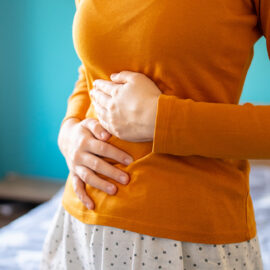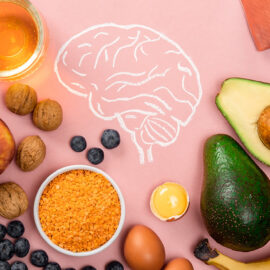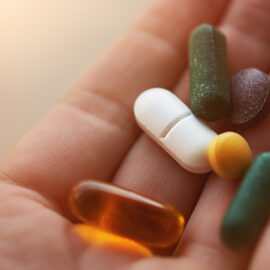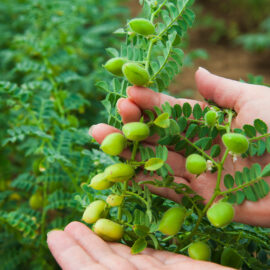The gut microbiome is made up of trillions of different microorganisms including bacteria, fungi, parasites, and viruses. Both symbiotic and pathogenic microbiota coexist in healthy individuals; however an upset in this balance due to infection, prolonged antibiotic use or certain diets can make the body prone to disease. The gut microbiota acts as an immune defense by breaking down potentially harmful substances, producing nourishing compounds, and competing with pathogenic compounds. Nondigestible carbohydrates, including starches and fibers, are not easily digested by the human body and travel to the large intestine where microbiota break them down, producing short chain fatty acids (SCFA). SCFA are used by the body as a nutrient for muscle function and potentially, disease prevention. Research has uncovered that SCFA may play an important role in the prevention of metabolic syndrome, bowel disorders, and some cancers.1 SCFA have also been shown to positively impact the treatment of ulcerative colitis, Crohn’s disease, and diarrhea associated with antibiotic intake.1 While there is still a lot to be understood, it’s becoming more and more clear that the microbiome is an important body system that supports overall health and therefore we must take action to nourish it.
How to Fuel Gut Microbiota
The gut microbiome is largely affected by genetics, medication, stress, illness, environment, and diet.1 The gut microbiota composition and SCFA production is affected by fiber consumption – both type and quantity.1 The types of SCFAs impact the pH of the colon which contributes to the types of microbiota that thrive in the environment and limits potentially harmful bacteria.
Prebiotics are the indigestible carbohydrates and fibers, like inulin, resistant starches, gums, pectin, and fructooligosaccharides, that fuel the beneficial gut microbiota and contribute to SCFA production. Fruits, vegetables, pulses, and whole grains are all important sources of prebiotic fibers that nourish the gut microbiota. Food particularly rich in prebiotic fibers include asparagus, leeks, garlic, onions, artichokes, bananas, and seaweed. While more research is needed, it appears the type of fat consumed may also impact the type of gut microbes due to inflammatory response.2
The Benefit of Fermented Foods and Probiotics
Probiotics are live beneficial microorganisms found in fermented foods like yogurt, kefir, kombucha tea, pickled vegetables, kimchi, tempeh, miso, and sauerkraut. Consuming probiotics as a supplement or in these foods may impact gut health by providing beneficial bacteria to an individual’s microbiome. In addition, biologically active peptides that are produced by the probiotics also provide health benefits including anti-oxidant, anti-microbial, anti-fungal, anti-inflammatory, anti-diabetic and anti-atherosclerotic activity.3
Improving Gut Health with Dietary Changes
Diet is a key factor that can influence the diversity, composition, and stability of the microbiome.4 While microbiome changes due to diet may be temporary, due to lack of long-term data, it’s not yet known if dietary changes can contribute to more permanent changes.4
Actions that may help improve gut health include increasing prebiotic-containing foods such as fruits, vegetables, whole grains, and pulses. Increasing the fiber in one’s diet should be done slowly to diminish unpleasant side effects, like flatulence and discomfort, along with an increase in water intake. Those with irritable bowel syndrome should increase fiber intake slowly and under direction of a registered dietitian nutritionist to evaluate tolerance. Foods containing probiotics, like yogurt, kefir, sauerkraut, and kimchi, can be incorporated into the diet to support the balance of beneficial bacteria in the gut.
When recommending or choosing probiotic supplements, it’s important to evaluate them. Keep these tips in mind when considering probiotic supplements:
 Choose a well-known, reputable brand
Choose a well-known, reputable brand Look for a product certified by a third-party, like USP or ConsumerLab
Look for a product certified by a third-party, like USP or ConsumerLab Check for a list of the probiotics contained in the supplement (Lactobacillus and Bifidobacterium are common groups)
Check for a list of the probiotics contained in the supplement (Lactobacillus and Bifidobacterium are common groups) Check the number of organisms that will be alive by the use-by date
Check the number of organisms that will be alive by the use-by date
“There are two important steps you can take to support this hub of wellness known as the microbiome. One is to up your fiber intake which helps to both increase bacterial diversity in the gut as well as nourish beneficial bugs residing there. The second is to reduce refined sugars which can feed the less favorable bacteria. Finding foods and products with high fiber and low refined sugar content can be an advantageous combination that can aid not only in digestive function but support immunity and overall health.”– Mary Purdy, MS, RDN, author of the Microbiome Diet Reset
For information on how to support gut health during holiday travel, check out this resource on our website and remember to wear a mask! A Healthy Gut Check for Holiday Travel
![]()
¹ den Besten G, van Eunen K, Groen AK, Venema K, Reijngoud D, Bakker BK. The role of short-chain fatty acids in the interplay between diet, gut microbiota, and host energy metabolism. J Lipid Res. 2013 Sep;54(9):2325-40. doi: 10.1194/jlr.R036012. Epub 2013 Jul 2.
² Caesar R, Tremaroli V, Kovatcheva-Datchary P, Cani PD, Bäckhed F. Crosstalk between gut microbiota and dietary lipids aggravates WAT inflammation through TLR signaling. Cell Metab. 2015;22(4):658-668.
³ Şanlier N, Gökcen BB, Sezgin AC. Health benefits of fermented foods. Crit Rev Food Sci Nutr. 2019;59(3):506-527. doi: 10.1080/10408398.2017.1383355. Epub 2017 Oct 20.
⁴ Leeming ER, Johnson AJ, Spector TD, Le Roy CI. Effect of Diet on the Gut Microbiota: Rethinking Intervention Duration. Nutrients. 2019 Nov 22;11(12):2862. doi: 10.3390/nu11122862.



